Muyunda was here to pick us up promptly at 9:30. We were particularly eager to see him since this was our first opportunity to give him the presents we brought him. We found out on our last visit that he likes country and western music--nothing we ever would have projected--and brought him some used CDs and an inexpensive player. He was delighted.
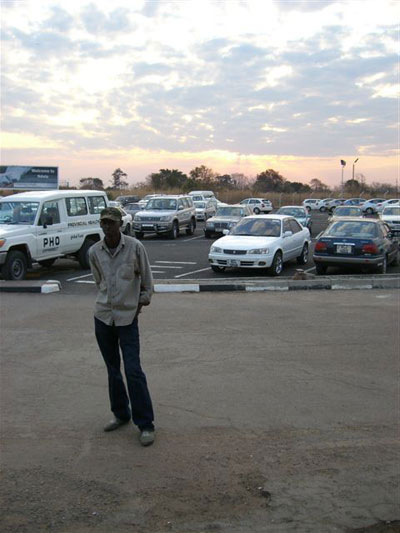
Muyunda with a great sunset behind him.
On the drive out, Muyunda mentioned being regularly questioned by his cohorts about the musungus (white people) always hiring him to drive. We asked what he told them. He said, "I tell them it's because I'm reliable." We asked if that's an unusual trait in Zambia. He responded that there are a lot of guys who like to get paid, but they don't like to work. When asked to say more about that he spoke of the challenges of growing up in a culture with so little opportunity. "By the time people are fourteen or so they have pretty much given up. They know they will never have a real job or a chance to make something of their lives and so they just start to drink." "Did you drink?" we ask. He told us that he had been a heavy drinker until one day when he realized he was ruining his health (a trip to the doctor showed he had contracted tuberculosis), and that he wanted something more for his life. He explained that somehow he realized he had to be patient and work hard if he wanted his life to change.
We would like to bring him on board in some capacity. He's a good man and could be a great influence on the young people. We're talking with the cooperative about some after-school mentoring programs.
At the compound we moved into the new building for our meeting. In attendance were most of the staff, including the security guards. First, we reviewed the next steps for the cooperative in order of importance to them. Buying a hammermill took first place in the polling. Everyone agreed on that purchase and that now is the time to act. One of the women in the cooperative had just returned from a walk to Twapia to grind her maize, and the feeling was that if we don't move quickly the opportunity to make a good return this season will be lost. We agreed that on Monday we would:
- meet with Zesco Electric to convert the electricity on the property to a service that will accommodate the hammermill.
- get Christopher's estimate for costs on the hammermill building. It needs its own building because it will shake apart any structure not constructed to withstand its jarring action.
- measure the distance and create a parts list to connect the electricity.
- go over with John, the plumber, his list of parts to finish the plumbing.
- meet with Gibson, Foster's husband, who will act as foreman on the job, to discuss what he will need to finish the bathroom tiling and the floors.
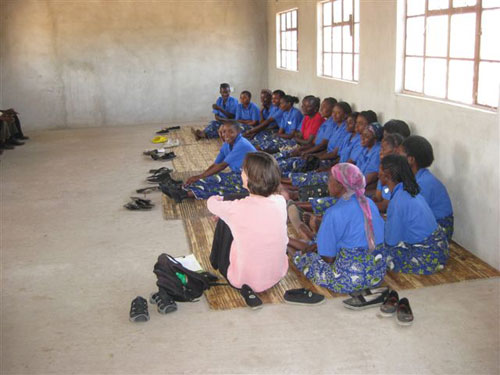
At the meeting.
Next on the list, coming in a very close second to the hammermill, was securing a plot of land on which to grow maize. It was decided that leasing for this season would be the way to go; we can consider buying next year if it works well. Foster leases a parcel of land about two hour's walk from Kantolomba and suggested we, too, could lease a plot there. When we expressed concern about the distance and spending four hours a day walking back and forth, Josephine informed us that Zambians are used to walking. Okay.
6. Pay the $40 to lease the land
We then talked a bit about how the cooperative will approach the loan repayment and group decision making, then discussed the importance of everyone working together to make this a success. We reminded them that the whole world is watching as they work their way up from poverty to sustainable community--no pressure! John spoke eloquently about the opportunity and possibility in this endeavor. He encouraged the group to be patient and to remember the empowering aspect in "...the more we work, the faster our lives improve."
We asked if there was anything else, and learned that five more people need loans to get roofs on before the rainy season.
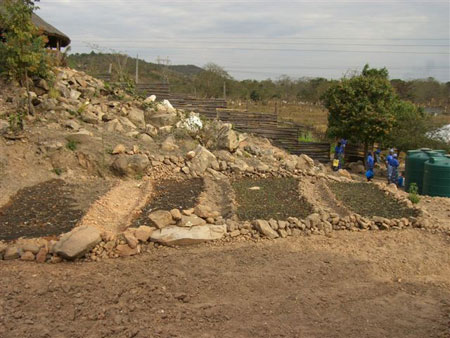
After the meeting we toured the fabulous vegetable gardens on the property!
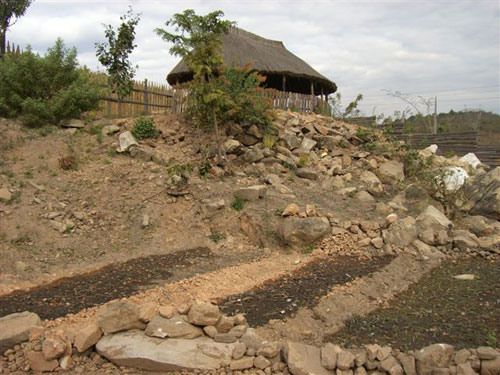
Looking up at the insaka. Seems like the property is more beautiful each visit.
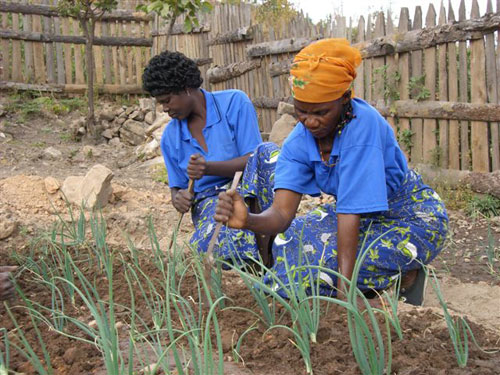
The women working on the onion bed.
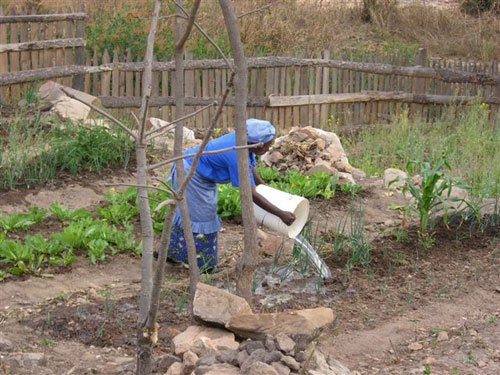
The watering all happens by hand, hauled by bucket. These women are STRONG!
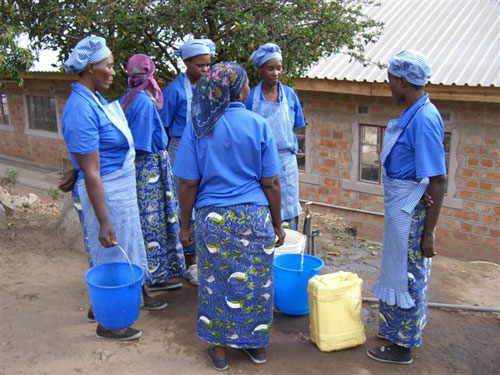
We figure waiting for the buckets to fill at the tap is the Zambian equivalent of the workplace water cooler.
In the just plain old good news department, we've seen two new babies, Elizabeth and Deborah, as well as the slightly older Jen, Cheri, and Dave--all chubby and healthy. Babies Cheri and Dave are now walking and talking. As the meeting broke up, John, who in addition to being a plumber is a very well-informed health-care educator, commented that the morbidity and mortality rate have dramatically decreased in Kantolomba since the arrival of Living Compassion. Couldn't get better news than that!
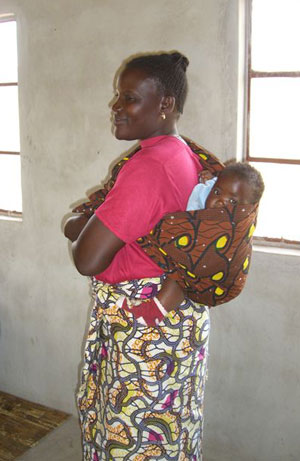
Elizabeth on her mamma Veronica's back.
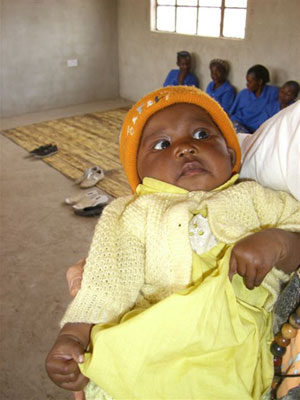
This photo does not do Deborah justice. She is one of the cutest babies we have ever seen!
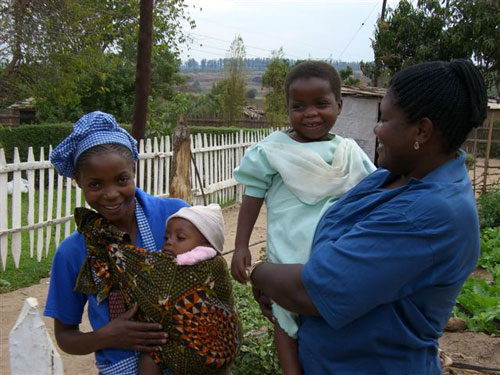
Josephine with Baby Cheri and Theresa holding Marion, Josephine's older daughter.
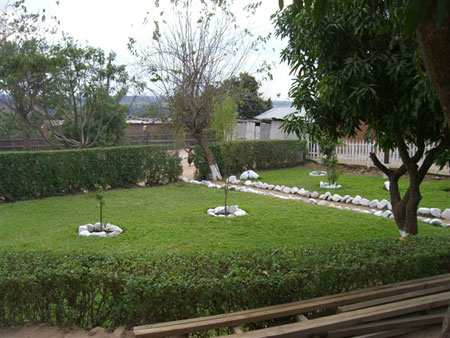
We learned that the staff are so proud of the extraordinary green lawn that the children are not allowed to play on it! We're going to see if we can put in a good word for those little tikes who are dying to get on there and have some fun.
Everybody, say a heartfelt thank you to yourself for making this happen. We're sending our thanks to you from Kantolomba.
Topping off an already fabulous day, we got to have Godfrey over for dinner! The boy is as charming and brilliant as ever. Watch for him in the world technology news in 5 years or so. Our apologies for forgetting, as we seem always to do, to take Godfrey's photo.
